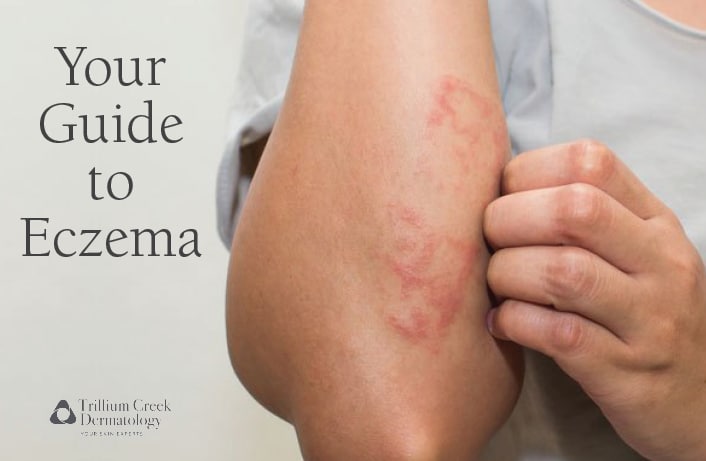
Eczema, or atopic dermatitis, is an itchy skin disease that can be difficult to treat. There are steps you can take to manage your symptoms with the help of your dermatologist. Here’s what to know about eczema and what you can do to get relief.
What is Eczema?
Eczema is a skin condition where your skin becomes red and itchy. It can be chronic and can flare, causing other symptoms like asthma or hay fever.
Symptoms usually include dry, rough skin, sever itching (usually at night), bumps that contain fluid, thick and scaly patches, and skin that is raw and sensitive from itching. Eczema is more common in children, but it can continue into adulthood.
What Causes Eczema?
It’s unclear exactly what causes eczema since it can come with many different factors in different people. It’s thought that eczema is caused by a gene variation that affects your skin’s ability to form a protective barrier. This barrier helps retain moisture and block bacteria, irritants, and allergies. Without this barrier, your skin can be especially susceptible to environmental irritations.
Primary risk factors for eczema include a family history of eczema, meaning you may be more prone to having it if one of your family members does. Additionally, certain allergies, as well as hay fever and asthma, can make you more prone to having eczema.
What Are Treatment Options?
It’s important to know that eczema can be difficult to manage, so getting help from your dermatologist can be a great first step. Eczema can be managed at home with some prescribed medications and professional therapies as well as at-home care.
At Home Prevention
Moisturizing your skin is extremely important when it comes to eczema. You should do this at least twice a day with both moisturizers and protective products to seal in moisture.
We recommend H&H Science Simply Bee Body Butter & Lotion Bar. It is handmade in Medina, OH with all-natural limited ingredients and no fragrance, dyes, etc.
You should also try to identify which things tend to cause flareups so that you can avoid them. This usually includes certain strong soaps or detergents, sweat, stress, dust, and pollen. Certain food allergies can also trigger flareups in certain people. Make sure to take shorter baths or showers, since extended exposure to hot water can cause your skin to be less effective at remaining moisturized.
Prescription Medications
Your dermatologist might prescribe topical corticosteroids as well as other medications called calcineurin inhibitors – these can help control your skin’s reactions to irritants. Due to scratching, eczema patients get infections easily. Your dermatologist will recommend and oral and topical antibiotic to help fight the infection. Oral medications like prednisone can quickly heal severe eczema.
Dupixent is an injectable medication, which has been approved for 6 years, clears eczema itching in 2-4 weeks.
Professional Treatments
Another treatment option, called Aurora™ phototherapy, can be an effective option for eczema to manage flareups. In this case, exposing the skin to controlled amounts of Ultra-violet light can produce results – in fact, people with eczema sometimes notice an improvement in their skin’s condition during the summer, so this treatment option mimics that phenomenon. This is often best paired with other treatment options like prescriptions and at-home steps.
See YOUR Dermatologist
Eczema and dry skin can significantly reduce the quality of your life. Our trained skin experts, can help you better manage your skin condition and avoid complications. Be seen quickly, diagnosed accurately, and heal faster at Trillium Creek Dermatology. To schedule, call: 330.725.0569


